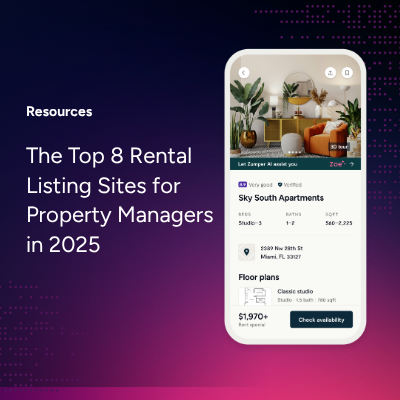
Renting out property for the first time might seem like a challenge, but it can actually be done with great ease. There are a lot of steps to consider, such as where and how to start, finding renters, and deciding whether or not they are a good fit for you and your property. This first-time landlord guide will answer any questions you have about how to lease a rental so you can tackle the job with confidence.
Rental Marketing
Rental Listing
The first thing you need to start with is a property description for a rental ad. You want to have a catchy title, a brief but informative description, and good photos.
Your listing’s headline should persuade potential renters to read your description. Add details about the property, school district, or geography of the area that might be appealing. For instance, you can discuss whether or not pets are allowed, give details about the views, and the property’s proximity to freeways, shopping malls, parks, and schools.
The description should elaborate on the title and add more features. Using descriptive words, illustrate what makes your property unique. Describe the neighborhood and talk about nearby stores and restaurants. Other important details to include are amenities, parking, appliances, air conditioning, utilities, security deposit, rent amount, landlord contact information, and policies on pets and smoking.
Photography
You will want to include high-quality photos of your rental property. Take a picture of every room, making sure that they are clean and well-lit. Using bright natural light will result in the best photos. Highlight special features in your photos, and take some pictures of the yard and/or view.
Pricing Your Rental
When it comes to pricing your rental, there are a few factors to consider. First and foremost, you must familiarize yourself with the rent control laws of the city your property is located in. Rent control laws determine what the maximum amount of rent you may charge is and how much you can increase the rent per year.
Next, do a search for properties in the neighborhood that are similar to yours, and base your rental price off of your competitors’ prices in a way that makes it attractive to renters. If your property has extra features that other properties do not, you could price the rental higher than average. However, try to keep it realistic, as higher prices might scare potential renters away. Overall, a property’s rental price is affected by the neighborhood and its proximity to schools, malls, and freeways, among other things.
To start marketing your property and attracting as many potential renters as possible, you’ll want to consider using multiple marketing methods. This means, advertise everywhere. Let’s look at some of the best ways to go about listing your property in the rental market. Hosting open house times will stimulate competition for your unit or home. Placing an advertisement in the newspaper is a great way to attract a slightly older demographic, while putting up yard signs can get the attention of anyone driving through the neighborhood.
Rental Advertisement
Advertise online. Many rental sites, such as Zumper, offer the possibility to list your property online and reach out to a large number of people. With so many potential renters using smartphones and computers, you will get results almost instantaneously. Depending on what it is you’re seeking, listing your property as a short-time rental will also attract traveling parties, but will require more effort, as the rental turnover will be higher.
Social media is another wonderful resource where you can ask other landlords, friends, and family members if they know of anyone who is looking to rent a home or unit.
One tip that may help you in the process of finding a quality renter is to build trust. When marketing your property, simply disclose any negative aspect of the property. This way, renters will know that you are being transparent. Additionally, being up-front with your property description will save you time by not having to show the unit to parties who will not be interested because of personal preferences.
Utilizing any or all of these sources should create a tremendous flow of potential renters. Having found potential renters, your next step is to screen them and find the best fit for you and your property.
Screening and Identifying a Quality Renter

Finding renters that qualify for your property doesn’t have to be difficult. The selection process can be broken down into the following parts:
- Pre-screening
- Rental application
- Credit and background check
- Income and employment verification
- Contacting references
Pre-screening
The pre-screening process can be subdivided into three parts:
- The rental listing itself. State your requirements in order to deter incompatible renters. You should be able to attract the best candidate possible, therefore, you’ll want to do credit and background checks. You should require the applicant to pay for a credit check; this shows that they are financially stable.
- The initial contact. Often, this is done by email or phone, and you can ask key questions to further select a renter who is a proper fit. Cover topics such as reasons for moving in, date of move-in, income, pets, smoking, and roommates. Also, ask if they are willing to submit a rental application during the first meeting.
- The property showing. During the meeting with an applicant, ask additional questions and look for incompatibilities. Pay attention to the candidate’s punctuality, appearance, whether or not they ask questions about the property, and ask again whether they are willing to go through a background and credit check. Finally, gauge their interest. If all these areas are to your liking, often this is the perfect opportunity to hand the applicant a rental application.
An additional and extremely important factor to remember while screening for renters is to comply with Fair Housing Act regulations. One cannot discriminate based on the following protected class categories: national origin, religion, sex, familial status, or handicap. Be aware that some states have additional protected categories. Also, make sure to be consistent in your screening process; i.e. treat every applicant equally and have consistent requirements for everyone.
Rental Application
A rental application should include a name, email, and phone number. Then, there are four important questions that you should ask:
- Have you ever declared bankruptcy?
- Have you ever been convicted of a felony?
- Have you ever been evicted?
- Have you ever refused to pay rent?
Remember, a quality renter should be responsible, financially stable, and not be a liability for you and/or neighbors.
The rental application should also ask for employment history. This is the first sign of financial stability, which is a sign of a good renter. We recommend requiring the applicant to provide their current employer, as well as two previous employers. You should require the company name, position (job title), salary, company address, and contact information of a reference at the company you can get in touch with.
As an added measure, require income verification to be certain that the renter will be able to pay their rent each month. To verify their income, you can request either a W-2 form, a recent pay stub, or an offer letter that states their salary. To determine if a renter is fit to rent your property, their monthly income should be three times that of the monthly rent amount.
However, in some cases, a renter may have an excellent financial history yet their income is only two times the monthly rent; this generally should not be a problem, especially if previous landlords confirm a history of on-time rent payments.
You might stumble upon a renter who will need to have a co-signer, although, accepting one is ultimately up to the landlord. A co-signer is simply another renter who would be financially responsible for payments should the main renter not be able to pay. In this case, you will need to screen the co-signer as well.
Make sure that the co-signer is fully aware of their responsibility to pay the rent should the renter not be able to do so. Having a co-signer can be a benefit because it guarantees that the rent will be paid by one of two parties on the rental agreement. However, the drawback is that you will have to deal with the possibility of having to collect rent from a third-party.
Your rental application should also include rental history to gain insight into the applicants renting behavior. It is recommended to ask for contact information of previous landlords; up to three addresses if applicable. Ask for the following information: property address, landlord name and contact information, the period of stay, and reason for leaving. Asking their reason for moving out is important because it may reveal potential problems, such as financial instability or disregard for property rules.
Lastly, you should require a signature, which serves two purposes. First, it verifies that all of the stated information is correct and second, that the applicant will allow you to contact the references in the application.
Credit and Background Check
To avoid falsified information on credit reports and background checks, be sure to process them yourself through a credible company. You may go through an online company, or if you know a real estate agent, they can do this for you and give you an analysis as well. With Zumper, you can request credit reports and background checks, for free. With a single click, an applicant will be notified to submit their documents and will be charged a $30 screening fee.
A credit check will provide you with a renter credit score and a detailed financial summary, which includes information on things like loans and mortgages. Their credit score is influenced by payment history, bankruptcies, and number of open accounts. Credit scores range from 300 to 850, with 850 being a perfect score. Here are some rule-of-thumb recommendations for interpreting this range of numbers:
- If the score is below 500, it is advised to turn the applicant away.
- If the score is between 500 and 680, you should discuss their credit history to better understand their financial habits. You also may want to consider requiring a co-signer who would be financially responsible for the rent.
- If the score is above 680, then go ahead with the rental process; i.e. contact references and discuss the lease agreement.
Note that landlords can set their own credit requirements based on the market they are renting in.
A background check will provide you with the applicant’s criminal history; Zumper provides landlords with a renter’s criminal history as well as their eviction and rental history, too.
It is quite simple to deny the applicant if you notice any criminal activity, but just to make sure, take the following into account:
- Severity of the crime
- Recency of the crime
- Frequency of criminal activity
- Relevancy (whether or not the crime was a misdemeanor)
- Legal considerations (meaning the criminal has to follow certain legal restrictions)
Income and Employment Verification
You should contact work references as soon as you have the applicant’s employment information. Contact can be made by email or phone, but the latter is preferred. A phone call is the best and most direct approach, which can help you gather additional information from the tone of voice of whomever you end up speaking to. Here are a few important topics you could inquire about:
- Confirm that the applicant has worked for them for the period stated on the application.
- Ask about what the applicant does for the company.
- Verify that the applicant indeed makes the salary he or she listed on the application.
- Ask whether or not the applicant is a responsible employee.
If you call a former employer, ask why the applicant parted with the place of employment. If you notice inconsistencies with the answers on the application, proceed with caution, as this can signal that you may have a negative experience with the prospective renter.
If for any reason you cannot reach the employer, you will have to rely on a credit and background check, which includes employment history.
Contacting References
Once you have all of the aforementioned information, it is time to reach out to the applicant’s references. Contacting a landlord will give you beneficial information and insight into your future renter’s behavior. When speaking to their previous landlord, you will first want to confirm that they did, in fact, rent a property from them. Then you should ask these six questions:
- Did he or she pay the rent on time?
- Was the property well-kept throughout their stay?
- Was the property in acceptable condition after the renter left?
- Was the renter respectful and communicative in relation to his or her neighbors?
- Would you ever rent out your property to said individual again?
Contact their current or most recent landlord and a previous one to paint an accurate picture of the renter.
In the event an applicant does not have a landlord, such as a recent college graduate with little or no rental history, then a basic credit check and employment reference should do the trick.
Rent Collection Methods

Now that you have found your ideal renter, it is time to discuss how to collect the rent.
The most recommended methods are payment in person, by post, or electronically. Ways of paying in person include check, cash, or money order. You can also do a direct deposit through a bank. If you are catering to millennials, then they will surely want to pay electronically, as they tend to be more tech-savvy.
Accepting rent in the form of cash is not recommended There could be a dispute about the amount of money that was handed over from a renter to the landlord, in addition to other complications.
Paying by check means the renter has to write it out, and you have to deposit it in the bank, although deposits with smartphones are possible nowadays.
A direct deposit is easy, but it means that your renters know your bank account number, which is a safety issue.
Lastly, there are online payments. Here, companies might charge both you and the renter for transaction fees, and additionally, there might be limits on the amount of money that can be transferred.
When choosing a payment method, select one that is the most convenient and safe for you.
Conclusion
This guide has provided you with important information for your first-time experience of renting out your property. Remember, the three key points in the process are: advertising your property, identifying and screening good renters, and collecting payment. The most important thing to note is that, whatever your approach is in your search, the end goal is to find quality renters for the long haul.



